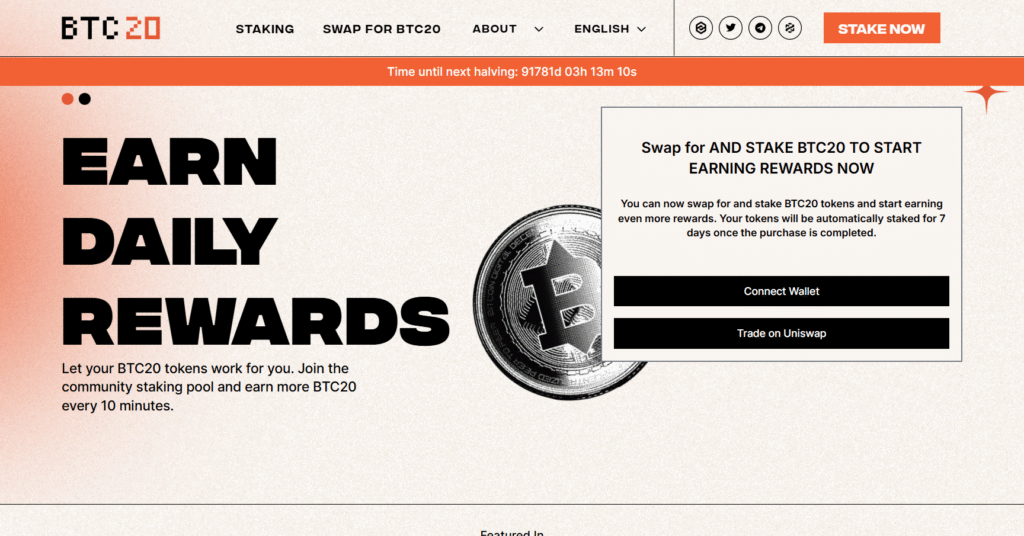Table of Contents
Introduction to BTC20
This is a comprehensive BTC20 review addressing circulating concerns—some even calling it a BTC20 scam. BTC20 positions itself as an Ethereum-based, Proof-of-Stake token mimicking Bitcoin’s supply and issuance schedule. The project claims to be registered in Belgium and launched via a highly successful presale that raised millions. But with growing skepticism and warnings from authorities, the question looms: is BTC20 a scam or a legitimate crypto innovation? This BTC20 review uncovers all the warning signs you need to evaluate.
Whether you’ve lost money investing in BTC20 or are hesitating to invest due to growing doubts, this analysis speaks to your frustration and need for clarity. Understand if BTC20 is a fraud before making any decisions.
BTC20: Regulation & Legal Status
BTC20’s promotional material suggests a Belgian registration, but there is no indication it is regulated by any established financial authority such as the FCA, ASIC, or CySEC. In fact, Belgium’s Financial Services and Markets Authority (FSMA) issued a public warning: BTC20.com failed to notify them for mass-media virtual currency promotion and reportedly failed to respond to inquiries.:contentReference[oaicite:0]{index=0}
Unregulated platforms often evade oversight, offering no investor protection or recourse in case of fraud. This is a classic red flag seen in many crypto-related scams. To learn techniques that help spot such scams, see learn how to spot a scam broker before it’s too late. The lack of oversight raises serious questions about whether BTC20 is a scam.
Trading Conditions & Platform Analysis of BTC20
BTC20 operates as a stake-to-earn token rather than a trading platform. According to its whitepaper, it mirrors Bitcoin’s issuance and halving schedule within an ERC-20 framework. Holders stake tokens to receive ongoing rewards via a smart contract.:contentReference[oaicite:1]{index=1}
However, BTC20 lacks transparency regarding liquidity, token distribution details, and audit coverage. Its platform does not offer common safeguards like verified liquidity sources or execution details. Without these disclosures, investor trust is difficult to justify.
Always know what you’re signing up for. Consider what to check before signing up with a trading platform. These missing details make it harder to dismiss the idea that BTC20 might be a fraud.
Reputation & User Reviews About BTC20
BTC20 has attracted buzz online, particularly during its presale, but credible reviews are scarce. Some Reddit users warned of typical staking-project pitfalls, such as locked withdrawals and unknown developers.:contentReference[oaicite:2]{index=2}
Additionally, BTC20’s profile receives mixed ratings on crypto tracking sites—community credibility and development activity are rated poorly.:contentReference[oaicite:3]{index=3}
Authorities have flagged withdrawal difficulties, broken contact info, and regulatory warnings—common indicators of risky platforms.:contentReference[oaicite:4]{index=4}
Taken together, these issues reinforce the uneasy question: is BTC20 a scam hidden behind hype and marketing?
How to Test Whether BTC20 Is a Scam
Here are practical steps to assess BTC20’s legitimacy:
- Check regulation status: Confirm through regulators like FSMA—and note that an FSMA warning already exists for BTC20.:contentReference[oaicite:5]{index=5}
- Inspect token metrics: Look for independent token audits, clear token allocation, and staking terms.
- Read real user feedback: Prefer long-form experiences over promotional blurbs. Scams often show repetitive and overly positive testimonials.
- Test minimal staking: If choosing to proceed, stake a small amount to verify unlocking, rewards, and contract behavior.
- Avoid guarantee traps: If the project promises guaranteed high returns, treat with skepticism.
- Use the FTC fraud reporting portal if you suspect fraudulent activity or want to check prior reports.
These checks can help protect you from falling into a scam.
Final Verdict & Alternatives
Based on regulatory warnings, lack of transparency, questionable staking mechanics, and presence of hype without substance, BTC20 presents multiple red flags. We recommend exercising extreme caution and possibly avoiding this project until matters are clarified.
For safer alternative options, explore more established crypto assets and platforms such as Ethereum staking via reputable services, or tokens with clear utility and audited architecture available on Coinbase, Binance, or Kraken.
Always favor projects and platforms that offer licensing, transparency, and strong community endorsement. The pressing question remains: is BTC20 a fraud? At this point, the evidence suggests skepticism is justified—and caution is your best ally.



